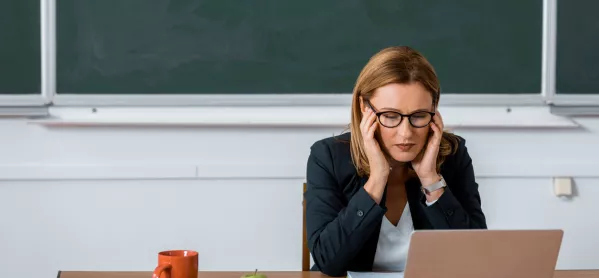- Home
- Pupil distancing hits teaching quality, teachers warn
Pupil distancing hits teaching quality, teachers warn

Nearly three-quarters of teachers have said they could not teach to their usual standard when schools opened more widely in July, according to a new report.
The study, The challenges facing schools and pupils in September 2020, carried out by the National Foundation for Educational Research (NfER), found that 74 per cent of teachers did not feel able to teach to their usual standard in July.
Coronavirus: ‘Our TAs stopped the school closing in lockdown’
Related: One in five teachers struggling to work from home
Sutton Trust: Teachers ‘need support for online lessons’
And just under half - 49 per cent - of the 1,034 teachers whose teaching was affected said that “distancing requirements had negatively impacted their teaching practices”.
The impact of social distancing on teaching
Teachers reported that social distancing meant they could not run group or practical work, and they “did not feel able to move around the class to teach, support and interact with their pupils effectively”.
And two-fifths of teachers - 39 per cent - reported that they could not access their resources as usual, which was impacting the standard of their teaching.
Teachers also said that having to teach mixed-ability groups, not knowing the pupils they were teaching, difficulties in accessing their own classroom and finding it hard to provide ongoing feedback to pupils all impacted the standard of their work.
“Having the children sat in rows at their own tables has removed the opportunities for partner work, shared work and discussions,” some teachers commented.
Others said that being unable to get close enough to a pupil to give them specific guidance was a challenge.
Furthermore, 46 per cent of teachers reported that they were teaching pupils they did not usually teach in June and July, and over half of senior leaders - 51 per cent - said they were using teaching assistants to cover classes to some extent.
“Failure to address [the impact of distancing on teaching] when schools reopen in September may lead to pupils falling further behind in their learning,” the report says.
The research also found that:
- On average, teachers estimate that their pupils are three months behind in learning, with over a fifth reporting that boys have fallen further behind than girls.
- Teachers in the most deprived schools are over three times more likely to report that their pupils are four months or more behind in their learning compared with teachers in the least deprived schools.
- Almost half of pupils are in need of intensive catch-up support, with those from the most deprived schools and schools with the highest proportions of pupils from BAME backgrounds in greatest need.
- Based on teacher estimates, the learning gap between disadvantaged pupils and their peers has widened by 46 per cent since the start of the pandemic.
- Almost 90 per cent of school leaders predict they will find it at least somewhat manageable to open to all pupils safely, although at considerable extra cost.
- Pupils’ and parents’ engagement with remote learning remained low in July. In total, 38 per cent of pupils returned their last piece of set work compared with 42 per cent in May.
The report also recommends that “in the event of a local lockdown, the dispatch of laptops will need to be rapid”, both for pupils who could not access remote learning, and for shielding teachers who had found they could not work remotely because of a lack of devices or internet connection in the summer term.
Dr Angela Donkin, chief social scientist at the NfER, said: “Whilst it is crucial that children catch up, we should not assume that teachers will immediately be able to deliver the same quality of teaching, at the same speed, as before the pandemic.
“There remains a range of barriers for teachers and schools, which means catch-up should be seen as part of the ongoing process of learning recovery, for most pupils, rather than as a quick-turnaround solution.”
Josh Hillman, director of education at Nuffield Foundation, added: “From September, schools will be trying to close the disadvantage gap while also balancing social distancing measures and delivering the curriculum for all pupils.
“Rather than being a quick fix, school catch-up schemes will need to be sustained if they are to be effective, and we would welcome additional government guidance and funding for schools as they develop new ways of working.
“This long-term approach is particularly important given the ongoing impact of Covid-19 on students’ family circumstances, such as increased levels of job insecurity, poverty and relationship breakdowns, all of which could affect their learning and development and further widen the disadvantage gap.”
Dr Mary Bousted, joint general secretary of the NEU teaching union, said: “Teachers across the land worked extremely hard during lockdown, teaching in school, developing online lessons and keeping in touch with pupils.
“Many families struggled to either have the quiet space or technology to access online learning, and the government fell short of its pledge to supply much-needed IT equipment to disadvantaged children who often had no access to the internet.
“With schools returning fully this week, we must look at immediate solutions that will benefit students quickly and effectively. As the NfER report indicates, schools are in urgent need of extra funding and resources to provide the right support for the young people in their care. The government must also redouble its efforts to support disadvantaged children with IT facilities for the home.”
Keep reading for just £1 per month
You've reached your limit of free articles this month. Subscribe for £1 per month for three months and get:
- Unlimited access to all Tes magazine content
- Exclusive subscriber-only stories
- Award-winning email newsletters



